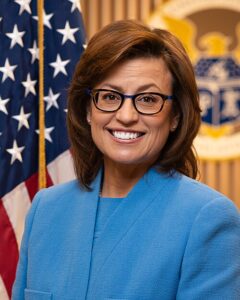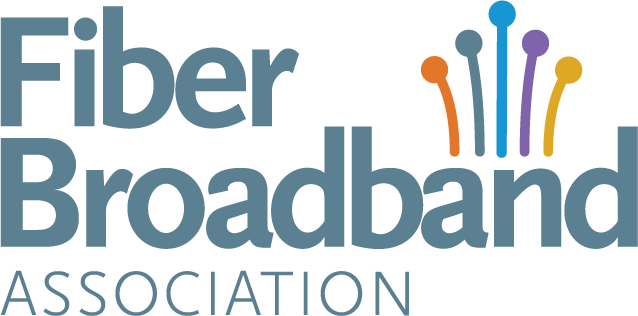FFB Summary Week 27: A Fireside Chat with FCC Commissioner, Anna Gomez The Role of Fiber in Powering the Future
FFB Summary Week 27: A Fireside Chat with FCC Commissioner, Anna Gomez
The Role of Fiber in Powering the Future 
FCC Commissioner Anna Gomez brings a diverse background and a deep commitment to public service to her current role at the Commission. Born in Bogotá, Colombia, and raised partly in the U.S., Gomez described her childhood as “a very good one,” noting Bogotá’s growth and vibrancy. “We did all the things that normal kids do—ride bikes, enjoy music, and yes, a lot of salsa dancing,” she shared.
Gomez’s journey into public service was driven by her interest in communications law during law school and an early internship at the Equal Employment Opportunity Commission (EEOC). A career-shaping moment came when a law firm colleague moved to the FCC and brought her along. “It was a happy coincidence,” she said. “I really love public service. My interest in communications law drew me to the FCC, but it was the mission that kept me in government.”
With experience spanning the FCC, NTIA, Senate Commerce Committee, National Economic Council (NEC), and State Department, Gomez emphasized that this cross-agency insight is essential. “It gives me a good view of how agencies process policy and what motivates them. That’s crucial when you’re trying to negotiate outcomes that benefit consumers.”
Now in the minority of a 2-1 Republican-led Commission following Commissioner Olivia Trusty’s confirmation, Gomez remains optimistic about finding common ground. “The vast majority of what the FCC does is bipartisan. We all want universal connectivity—it’s the how that differs. I’m committed to open dialogue and negotiating outcomes that work for consumers.”
Still, she has voiced concern about broader issues she sees within the administration. “I’ve been outspoken against what I consider a campaign of censorship and control… whether it’s retaliation against universities or attacks on broadcasters’ editorial freedom, I find it alarming,” she stated.
Yet, on broadband and communications infrastructure, Gomez sees areas of alignment. “The Chairman and I talk a lot about spectrum—efficient spectrum management is something we both care about,” she said. “We also agree on accelerating infrastructure deployment, space policy, and enforcement actions, like cracking down on signal jammers used in home break-ins.”
She supports a technology-neutral, all-of-the-above approach to rural broadband. “Fiber is critical to building scalable, reliable infrastructure—but in hard-to-reach areas, fixed wireless or satellite might be most practical. Still, satellite remains unproven at scale, and fixed wireless has capacity limitations,” Gomez cautioned.
Commissioner Gomez sees investment in broadband as an investment in the next generation’s ability to learn in rural communities, access to health care and in working families, the ability to thrive in an increasingly digital world. When it comes to federal infrastructure investment through programs like BEAD, she stated that “The government should place trust in the communities that the investment is meant to serve. States that submitted plans for the use of BEAD funding after months of analysis and planning have been told to start over and not because their plans lack merit, and that’s not right. We should let the facts guide their decisions. The states have done the work. We should respect that process and their expertise. They have assessed the terrain, consulted their communities, and identified the technologies that make the most sense for their geography, their population and their future.”
On affordability, she commented on the lapse of the Affordable Connectivity Program (ACP). “It was the most successful affordability program in our country’s history. Congress needs to act—access without affordability is meaningless,” she said. “I don’t want to build a bunch of bridges to nowhere if what we deploy is unsustainable because of the lack of support.”
Gomez applauded the Supreme Court’s recent ruling upholding the constitutionality of the Universal Service Fund (USF). “Thank goodness. This gives Congress the clarity to move forward with bipartisan reforms,” she said, pledging support for legislative efforts that preserve affordability and don’t overburden consumers.
Gomez also addressed the strategic role of broadband in economic development. “Access to high-speed broadband is essential for communities to attract businesses, factories, AI data centers—you name it. It’s about opportunity, education, and healthcare. Connectivity drives prosperity,” she said.
Finally, when asked what she hopes her legacy will be, Gomez was direct: “I have been focused on speaking truth to power, even and especially when it’s difficult to do so. So, I would like to be remembered for standing up and speaking out about the issues impacting people across this country, even when my job was on the line.”
With a newly re-formed quorum, pressing priorities like spectrum policy, broadband affordability, regulatory modernization, and USF reform are all on the table. Gomez’s principled approach promises to keep the focus on connectivity, equity, and consumer impact.
Click here to listen to the full episode or find previous episodes of Fiber for Breakfast.




